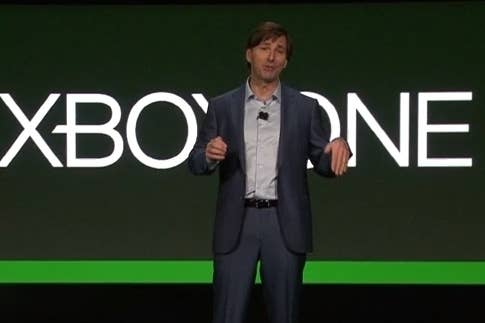Role-Playing: Xbox chief Don Mattrick
Coming out of E3, Mattrick and Microsoft have been feeling gamers' scorn. Our panel steps into the exec's shoes and offers advice on what to do next [UPDATED]
Update: Microsoft, just minutes after we published this piece, did a complete reversal on its used games and always-online policies. Read all about it here, but the discussion below is still interesting!
The annual E3 Expo is usually a time for leading game companies to strut their stuff, get gamers, retailers and press alike excited for the next 6-12 months. Microsoft, however, turned what should have been an Xbox One celebration into a PR nightmare, thanks to policies on used games and online authentication.
In this edition of "Role-Playing" we asked our panel of industry experts to step into Don Mattrick's shoes and figure out what the best course of action really is leading up to the launch of the Xbox One this November.
Our panel was specifically asked to respond to this setup: "You're the head of the Xbox business, your reputation just took a beating at E3 as Sony delivered an uppercut punch, wisely capitalizing on a very touchy subject with core gaming consumers: used games and always-online. The public relations battle that your company and brand now faces is massive. How do you handle this situation? What are the next steps?"
Dan "Shoe" Hsu, EIC of GamesBeat

I've actually been role-playing "Xbox executive" all of last week during E3, giving various friends my unsolicited opinions on what Microsoft should do now. It's actually pretty easy! Assuming this is all financially viable: 1. Apologize to the gamers. 2. Give the gamers what they want. 3. Offer a new no-Kinect SKU at $400.
I'm sure Microsoft doesn't want the embarrassment of admitting that it was wrong, but gamers and consumers would respect a move like that like you wouldn't believe. In one simple public apology, Microsoft can instantly win back all the goodwill it recently lost, save from a few grumpy "it's too late for that now" holdouts.
Obviously, Microsoft wants a Kinect in every home alongside the Xbox One, but is that strategy worth coming out at $100 more than the PlayStation 4? I bet no one outside of the company would argue "yes." So it may be time to concede that fight.
Bottom line: Microsoft needs to be directly competitive with Sony on every bullet point. And they need to do it now before it's too late.
Tim Clark, Group Senior Editor - Games at Future

There are times in life when only a fulsome, ideally tearful, apology will do. I am Don Mattrick, and that time is now. In terms of mess ups, I have bet the kids' college fund on a horse named Digital Rights Management that has been shot dead by the crowd before the race has even started. Okay, this is not my best analogy, but then this is a difficult time for me. Instead of watching the Xbox One pre-orders roll in, I am sat shivering in the unicorn skin-lined executive toilet at Redmond, staring balefully at the screen of my Surface as the internet forms a not-so-orderly queue to kick the Xbox division to death. Unless I do something. But what, goddamnit? Think, Don, think!
Okay, it's actually easy: F. Scott Fitzgerald opined that "there are no second acts in American lives". This was and is nonsense. America loves few things more than cheek-burning public shame followed by an apology and a comeback. Ask Tiger Woods. Or Martha Stewart. (But not Chris Brown: some shit will not come out in the wash, ever.) So here's what I do. I stop acting like Don Mattrick, droid in chief of the DRM Deathstar, and start saying sorry.
First I apologise for trying to choke the life out of the re-sale of physical games prematurely, because I now realise the shift to digital will happen anyway (duh) and there's little benefit to being perceived as the supervillian of the consumer rights comicbook just for the sake of a little extra revenue when cash in the bank isn't the problem anyway. So I row back entirely on our user policies, and leave them exactly as they are on 360. That's one point of differentiation with Sony erased, and although the badwill is likely to linger, Xbox Live is a still more robust service. Maybe I even point out that PSN got hacked and went down for weeks. Weeks! And those frigging ingrates are complaining about a 24 hour check-in? Motherf...
No Don, don't let them hear your inside voice.
Instead I take a deep breath. Then I also admit we got the price wrong. Blah blah "straitened times" yadda yadda "highly competitive market" rhubarb rhubarb "...here's $50 off". It'll mean taking a bit of a bath because of the cost of bundling all those Kinects, but we'll recoup that when the price of the chipset eventually comes down. More importantly, it'll put us back in the game - of which we're decidedly out of right now. What is not an option is just trying to tough it out. Every general will make a mistake and find himself outmaneuvered at some point. The bad ones don't alter the plan of attack, and see their men massacred as a result. The PS3 was almost delivered stillborn thanks to Sony's ludicrous pricing. A generation spent waging a scrappy guerilla war has seen the Japanese giant humbled, only to emerge a tougher, wilier competitor. Hubris is seemingly the fate of all dominant platform holders, but I can avoid my company going through the same process by acknowledging our - my - mistakes now, and rectifying them fast.
What I'll likely actually do: Point at Titanfall and pray.
Keza MacDonald, IGN UK Games Editor

Assuming that it's impossible to walk these policies back at this late stage, I would absolutely open up a frank conversation with gamers and the press about exactly what's going on. I would provide clear and comprehensive answers to the questions that still remain about game ownership on Xbox One, and I would talk about the things that are enabled by always-online as opposed to the things that are made impossible by it.
There are still a lot of mixed messages around Xbox One, and that is leading to doubt and anger springing up to fill the gaps in consumer knowledge. If Microsoft is completely open with information between now and launch, at least potential purchasers can make an informed decision.
Jon Kimmich, CEO of Software Illuminati, Adjunct Prof. at DigiPen Institute of Technology

I'm sure Don, Phil, Marc and the rest of the senior management of Xbox would like to restore from a save game to a couple of weeks before E3 and replay, but that only works for games.
I think that we tend to forget that a decade ago, the original Xbox (and one of its premier launch IPs - Halo) was in a somewhat similar position coming out of E3. The game had not shown well, and called into question the capabilities of the hardware, the strategy of targeting some of the PC gaming community that traditionally played shooters and the ability of Microsoft to engage and delight core gamers and the core gaming press. Despite all of this, during the intervening decade the platform went on to become the #1 selling one in the US, and Halo the most important IP on it.
What happened after that E3? A number of things. First, rather than turtle up behind its PR and marketing agencies and say, "Everything's fine", the issues that arose at the show were acknowledged. "Yes, we know there were issues, here's what they were, why they were and how we plan to get from here to launch and deliver on the promises we're making." Along with that, internally, hard questions were being asked of the teams about what had happened, and how to fix it. Some of that got public play (Halo's issues w/ split-screen) others did not. Finally, and I think most importantly, the company approached the industry (both gigantic publishers as well as smaller one, what we would call "indie" now) with a degree of humility about gaming and what it takes to be successful and how Microsoft and Xbox would bring value (such as console multiplayer and broadband) that justified not only the cost of the platform, but why Microsoft should even be considered a player in the space.
In light of this, I'd like to think that the team in Redmond is siting around a conference table this week asking themselves questions such as, "What benefit ARE we providing in return for requiring daily connectivity to the internet, and limiting game sharing? And how do we more effectively communicate that? How do we approach the community of players and developers with humility, rather than what comes across as arrogance?" These are all questions with answers, and they are all solvable problems (though perhaps not without a certain amount of pain). But until MS answers these questions, publicly, and adjusts their attitude accordingly, the core games press will continue to pick up every issue, large or small, and pounce on it. And some of that will bleed into the mainstream. Since the show I've been asked by several casual (unless Starbucks baristas over-index in hardcore console gaming) consumers whether I thought Microsoft would chance their online connectivity requirement. To me, that is empirical evidence of a problem that cannot be ignored.
And, until MS alters its approach and message, for Sony it will be the gift that keeps on giving.
Scott Steinberg, CEO of consulting firm TechSavvy Global

For starters, you begin by addressing the issue head-on, and being up-front with customers - more clarity, insight and detail into their core concerns, and any points of contention or confusion surrounding them, is vital. The points raised need addressing ASAP, and handling in such a way that reassures shoppers and works to best meet their needs, rather than simply being skirted around or spun in such a way as to paint such design choices in the best positive light from the manufacturers' perspective. Used game restrictions and always-online connectivity are topics that have clearly struck a chord with the public, and need to be reexamined in greater depth: Rather than providing more reasoning behind these decisions or information justifying such choices, buyers should instead be offered concrete examples of how these services can work in a way that's unobtrusive, benefits them, and adds to the experience, and tangible reassurances they can trust - in other words, more reasons to believe that these issues won't blossom into even bigger concerns going forward, and more reasons to believe that these potential pitfalls aren't as broad and deep as they seem.
Customers are clearly making their voices heard, and require a meaningful response - the big question being whether it will come in the form of a direct rethinking of these issues (if even possible this late into development and production), the demonstration of potential alternate policies and workarounds that won't interfere with the everyday gaming experience, or in the form of direct software examples that show how these systems can be workably utilized in everyday contexts that won't interfere with the gaming experience. Public commitments from major publishers to adhere to offering solutions that make these concerns null and void, and work towards customers' best interests, would also go a long way to helping build trust, especially if backed with visible demonstrations - which is to say that greater reassurance and hard and fast examples of these systems in motion, and how they a. add to, not detract from potential value and b. won't have as great a negative impact on the gaming experience as rivals might allude is now essential. Tis isn't a problem that will go away, or can simply be swept under the rug.
The name of the game now is meeting consumers on even ground, ensuring their voice is heard, and demonstrating how it's being taken into account, not simply ignored or discounted as competitors would suggest. Buyers, trade partners and the media need reassuring, and they need to see systems up and running in ways that benefit, not detract from, their gaming experience ASAP as well as promises they can count on from both Microsoft and its third-party publishers to ensure that shoppers enjoy the best possible experience. The situation is certainly precarious - however, there's still time to reexamine decisions, rethink choices in light of public opinion, and tell a new story here: One that acknowledges and addresses shoppers' opinions, and shows that the company is truly taking them into account, and finding ways to not only clear up any lingering misconceptions, but truly learn from what its customers are saying, and using this to adapt its strategy to best meet their needs. The best defense here? Keeping an open mind, being willing to hear what shoppers are saying, and going on the offensive, finding ways to acknowledge potential mistakes, and use the community's outpouring of feedback as a wake-up call to rethink their approach and potentially provide a better aligned, more compelling value proposition.
Tom Bramwell, EIC of Eurogamer.net

I'm Don Mattrick? OK, well first of all I need to stop shooting from the hip when I talk to the press, because I keep saying things that inflame tensions with my customers. I clearly don't know what their hot buttons are - which is OK, because I'm supposed to be running a corporation, not browsing Reddit - so I should leave that to people who do understand the issues. Either way, the balance is currently wrong or we wouldn't be getting slated.
As for what's next? Well, if I believe in the Xbox One strategy then I should get on, execute it flawlessly and hopefully it works. Maybe being able to switch between Forza 5 and Wheel of Fortune while talking to someone on Skype really is a killer application and everything will be fine. I probably am right that people will buy all these games regardless of the revolting DRM we're insisting upon, so as long as I am blissfully unaware of the terrible repercussions my actions could have on the medium overall - or maybe I'm aware and don't care - then why change anything? I mean, I've sold nearly 80 million Xbox 360s. I must know something.
If I am having second thoughts, though, maybe the best thing is just to dial a few of these things back and make them optional. If I honestly believe physical media is dying, why is it a threat to let people own games on discs and play them on any system like they can now? We keep saying that the licence thing is the same but even I can see that's false equivalence and no-one's buying it. And why should those physical media guys need to do the 24-hour online check-in thing? It seems a bit contradictory to claim discs are on the way out and yet insist on these licence-based always-online security measures for disc content. The online check-in thing could be modified to apply only to digital content, too.
Then again, it would be a pain to get that stuff organised, so I might just leave it and see what happens. I clearly do like all these games and think these transmedia initiatives are clever and interesting, and if previous generations have shown me anything it's that gamers are fickle and we can win them over with the right games, content deals and pricing initiatives. Their bark is always worse than their bite and as long as they remain that way and we've bought the right games then I might as well stick to what we're doing. It would certainly suit us to do so.
Man, I really wish Gabe Newell would sell me Steam! Didn't he get the flowers and the cheque?

